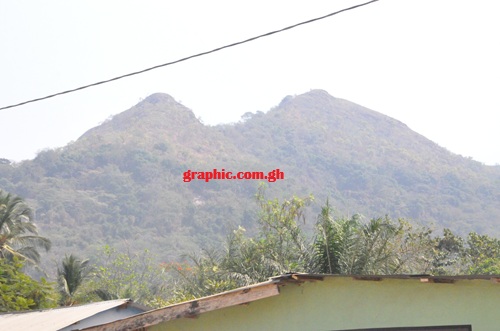
Forest fire ravages Afadjato
A devastating forest fire has destroyed a large portion of the tree cover on Afadjato, Ghana’s highest mountain, halting the bustling tourism activities in the resort community of Liati-Wote, located at the foot of the mountain, for several days.
The fire also ravaged vast farmlands of cocoa, coffee, plantain, banana, maize, vegetables, and cassava along the slopes of the 885-metre highland.
When GraphicOnline visited Liati-Wote in the Afadjato-South District of the Volta Region on Friday, January 17, the community was eerily silent. Most residents were at home assessing their losses, adding to the subdued atmosphere in a place where noise-making and keeping dogs are traditionally forbidden.
At least eight cocoa and plantain farmers lost their plantations to the inferno, while other farms were saved by the efforts of patriotic local firefighters.
The fire, which raged for three days, also claimed numerous wildlife species, including antelopes, impalas, tortoises, grasscutters, snails, snakes, and butterflies. The once-lush mountain now stands barren, with charred trees leaving a sombre brown hue.
The Chief of Liati-Wote, Togbe Kordadza V, attributed the fire to careless charcoal burning by a man from a neighbouring community.
"The fire was the result of charcoal burning by a man who left the flames from the charcoal unchecked, making it spread rapidly with the aid of the strong harmattan wind in the extremely dry weather," he explained.
The chief described the fire as a major blow to the livelihoods of the people in Liati-Wote, crippling the once-thriving holiday resort community.
“We know the community where the charcoal burner came from, but for the sake of peace, we will not pursue the matter,” he stated.
To prevent future occurrences, the community is exploring the possibility of forming a vigilante group to monitor and apprehend individuals responsible for fires on the mountain.
Impact on tourism
The Tourist Site Manager for the community, Albert Tawia, provided details about the fire’s timeline.
“The brutal fire, which started on January 10, raged on the next day and subsided on January 12,” he said.
Following the fire, tourists were temporarily barred from visiting Afadjato and Tagbo Falls for safety reasons, as smouldering embers posed a risk. However, tours have since resumed.
“But the tours have now resumed, and tourists are visiting the mountain and the fall again,” Mr Tawia added.
Tourism statistics highlight the growing appeal of Liati-Wote. Last year, 8,834 tourists from the USA, Germany, Netherlands, Switzerland, Nigeria, Togo, Benin, Brazil, and other South American countries, as well as other parts of Ghana, visited the community. This was an increase from 8,234 visitors in 2023 and 6,615 in 2022.
“So, you can see the number of tourists coming from across the world keeps increasing yearly, so we do not want fires to scare the visitors away,” Mr Tawia stressed.
Liati-Wote, with its population of about 600, boasts captivating natural features, including the Twin Mountain, a plastic recycling centre, an art gallery, and a recreational garden, further enhancing its tourism appeal.
Other challenges
Liati-Wote’s challenges have been compounded by a severe water shortage caused by the prolonged dry season. The community’s five boreholes and streams fed by Tagbo Falls have dried up, leaving residents reliant on bagged and bottled water supplied by traders.
The 12-room Tagbo Falls Lodge, equipped with a mechanised borehole, is supporting the adjacent community guesthouse with water.
“But the situation now is terrible, with little water for the people,” lamented the owner of Tagbo Falls Lodge, Togbe Tudedzi I.
Adding to the woes is the poor road network. The eight-kilometre untarred road linking Liati-Wote to Liati-Agbonyra is excessively dusty, making visibility hazardous for travellers.
